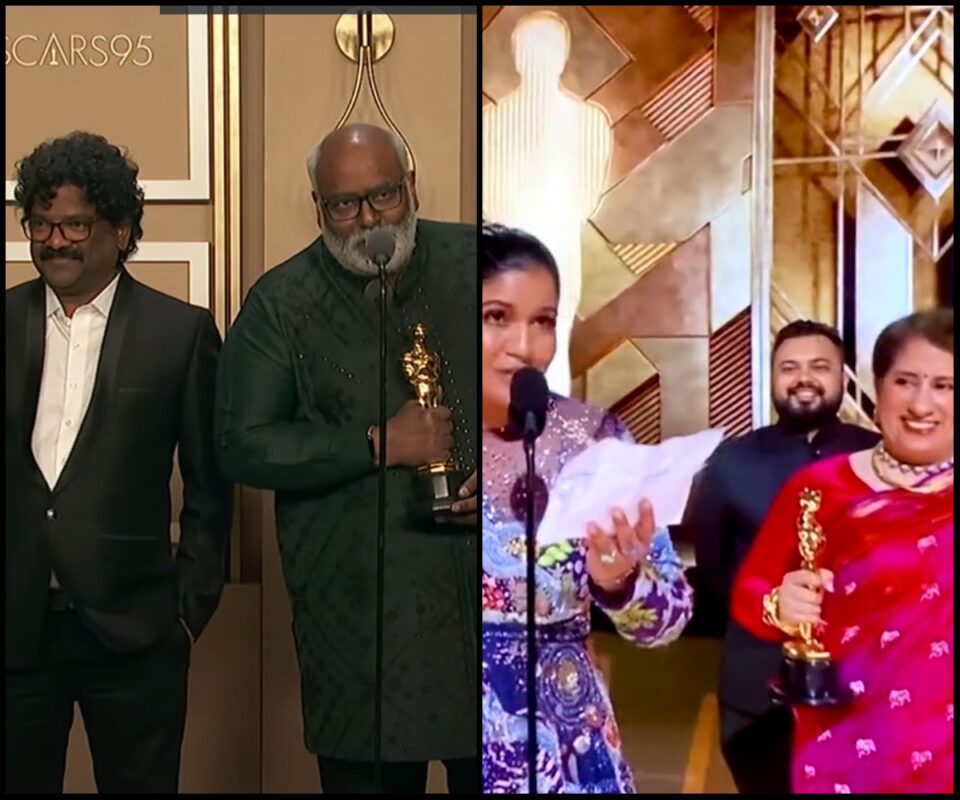India Starts A Triumphant New Chapter in Cinema with Two Academy Awards
“Naatu Naatu” from ‘RRR’ and ‘The Elephant Whisperers’ make history at the Oscars

(from left to right) Chandrabose, MM Keeravaani, Kartiki Gonsalves and Guneet Monga at the Oscars 2023 with their wins. Photos: The Academy; ABC
India made history on Monday morning by bringing home two Oscars from the 95th Academy Awards, opening a triumphant new chapter in the cinematic history of the world’s largest producer of films.
“Naatu Naatu,” the high-energy dance number from the blockbuster RRR, won the trophy for Best Original Song, the first song from an Indian film to win the honor, and director Kartiki Gonsalves’ The Elephant Whisperers won the award for Best Documentary Short Subject at the Oscars‘ ceremony held in Los Angeles’ Dolby Theatre. It’s the first Indian film to win an Oscar in this category and Gonsalves dedicated the award to “My motherland India.”
Though both “Naatu Naatu” and The Elephant Whisperers brought cheer to film-crazy fans in India who were up at 5 am to watch the ceremony live, India’s big moment at the world’s most glamorous awards show was somewhat marred by disappointment. Director Shaunak Sen’s stunning documentary All That Breathes, nominated in the Best Documentary Feature Film category, lost to Daniel Roher’s Navalny.
Speaking with Rolling Stone India on Sunday night, Sen seemed to be in a somber mood. Responding to an “all the best” text, he said, “Thanks so much, looks like we are losing though!”
Many other film awards and predictions leading up to the Oscars had projected that the 95th Oscars had the Ukraine war and Vladimir Putin on its mind, and was going to vote accordingly.
Early on at the Oscar ceremony on Monday morning, before the awards for Best Original Song was announced, Bollywood star Deepika Padukone, looking gorgeous in a black, off-shoulder Louis Vuitton gown, arrived solo on stage to introduce the performance of “Naatu Naatu.”
Speaking amidst loud cheers and clapping before its live performance, she said “Naatu Naatu” has an “irresistibly catchy chorus, electrifying beats and killer dance moves to match have made this next song a global sensation,” and added, “It’s also a total banger.”
Against the backdrop of Mariinsky Palace (Ukraine’s Presidential Palace) in Kyiv, where the original song was shot over 15 days, “Naatu Naatu” was sung on stage by Rahul Sipligunj and Kaala Bhairava as a dance troupe performed.
The song-and-dance performance was brief but thrilling and received a standing ovation.
“Naatu Naatu” (which means, “dance, dance”), performed in the film by Jr. NTR and Ram Charan, was choreographed in the film by Prem Rakshith with about 95 dance steps, including its challenging one-foot-swinging-in-the-air hook-step.
Later, as presenters Janelle Monae and Kate Hudson opened the envelope to announce “Naatu Naatu” as the winner in the Best Original Song category, beating daunting competitors that included Rihanna, director S.S. Rajamouli jumped from his seat with excitement. Composer M.M. Keeravaani and writer Chandrabose took the stage to receive the trophies.
“I grew up listening to The Carpenters,” Keeravaani said, and sang the rest of his acceptance speech which was in verse and set to the tune of the American band’s 1973 hit song, “Top of the World”:
“There was only one wish on my mind,
So was Rajamouli’s and my family’s
RRR has to win
Pride of every Indian
And must put me on the top of the world,” he sang.
Keeravaani’s speech, running over the strict 45-second speech time, left Chandrabose just enough time to say a gentle “Namaste” into the mic before they were both ushered away.
Director Kartiki Gonsalves, 36, who spent five years making The Elephant Whisperers, gave an acceptance speech that was sober and stirring.
Taking the stage along with producer Guneet Monga to receive the trophy for the Best Documentary Short Subject, she said, “I stand here today to speak for the sacred bond between us and our natural world, for the respect of indigenous communities, and empathy towards other living beings we share space with.”
She thanked the Academy for “highlighting indigenous people and animals,” distributor Netflix, and the film’s two stars — elephant caretakers Bomman and Belli — “for sharing their sacred tribal wisdom.”
Later on Twitter, Guneet Monga wrote, “We just win [sic] the first-ever Oscar for an Indian Production! Two women did this! I am still shivering,” and signed off with red heart and elephant emojis.
The Elephant Whisperers is Gonsalves’ debut film. Shot in the 140-year-old Theppakadu Elephant Camp, in Tamil Nadu’s Mudumalai National Park, the heart-warming and beautifully-shot film follows Bomman and Belli, who belong to the Kattunayakan tribe, and are taking care of young Raghu, an orphaned baby elephant.
Once Raghu is all grown up, Bomman and Belli are put in charge of nurturing the bringing up Ammu, another orphaned baby elephant. By the end of the film, Bomman and Bellie are married and in the service of making sure abandoned, orphaned baby elephants left in their care don’t just survive, but thrive.
The film is streaming on Netflix.
The 95th Oscars will forever remain a momentous chapter in Indian cinema’s history. Not just for the number of Indians who were on stage performing, announcing and receiving trophies, but also because of who bagged the Oscars.
For all the love and adulation that Indians bestow on Bollywood, the men and women who are bringing the trophies home are from South India. All of them.







